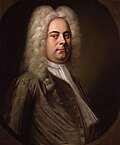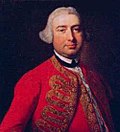Ariodante
Ariodante is an opera seria in three acts with music by George Frideric Handel. The libretto was based on parts of Ludovico Ariosto's Orlando Furioso. Handel put some ballet music in the opera for the famous dancer Marie Sallé.
| Ariodante | |
|---|---|
| by George Frideric Handel | |
 Handel in 1733 | |
| Genre | Opera seria in 3 acts |
| Librettist | Riccardo Broschi |
| Language | Italian |
| Premiere | Covent Garden London, England 8 January 1735 |
The opera was first performed in the Covent Garden Theatre, London, on 8 January 1735. It opened Handel's first season at Covent Garden. It was a great success. It was performed 11 times during its premiere season.[1]
It eventually was forgotten. The score was published in the early 1960s.[2] In the 1970s, the work was revived. It is thought to be one of Handel's best operas.
Roles
- Ariodante, a vassal prince - mezzo-soprano castrato
- Ginevra, daughter of the King of Scotland, betrothed to Ariodante - soprano
- Dalinda, attendant on Ginevra, secretly in love with Polinesso - soprano
- Polinesso, Duke of Albany - alto
- Lurcanio, Ariodante's brother - tenor
- King of Scotland - bass
- Odoardo, favorite of the king - tenor
Story
Ginevra is engaged to Ariodante. Polinesso is in love with her. He uses Dalinda to trick Ariodante. She tells Ariodante that Ginevra is Polinesso's lover. The King disowns Ginevra. Ariodante is reported to have killed himself. Polinesso then sends his agents to kill Dalinda because she was the only witness to his plot. Ariodante is alive. He drives off the assassins. Polinesso eants to win the King’s favour. He offers to defend Ginevra's honour in a tournament. He is wounded by Lurcanio. Ariodante has learned about Polinesso’s plot from Dalinda. He now appears. He offers himself as Ginevra’s champion. Polinesso confesses his guilt and dies. Ginevra is pardoned by the King.
Ariodante Media
Interior, Theatre Royal, Covent Garden, where Ariodante was first performed
Anna Maria Strada, who created the role of Ginevra, by John Verelst (circa 1732)
Dalinda disguised as Ginevra admits Polinesso to her bedroom, engraving by Gustave Doré
References
- ↑ Baxter, Robert (1985). "Ariodante". The Opera Quarterly. 3 (3): 191–192. doi:10.1093/oq/3.3.191. Retrieved 29 September 2007.
- ↑ "J.A.W." (no full name given), "Reviews of Music: Collected Editions – Ariodante (edited by Karl-Josef Fürth) (January 1962). Music & Letters, 43 (1): pp. 83–84.
- Dean, Winton (2006). Handel's Operas, 1726–1741. Boydell Press. ISBN 1843832682. The second of the two-volume definitive reference on the operas of Handel.
Other websites
- Score Archived 2012-12-17 at Archive.today of Ariodante (ed. Friedrich Chrysander, Leipzig 1881)
- San Diego OperaTalk! with Nick Reveles: Handel's Ariodante[dead link]
- Italian libretto online







